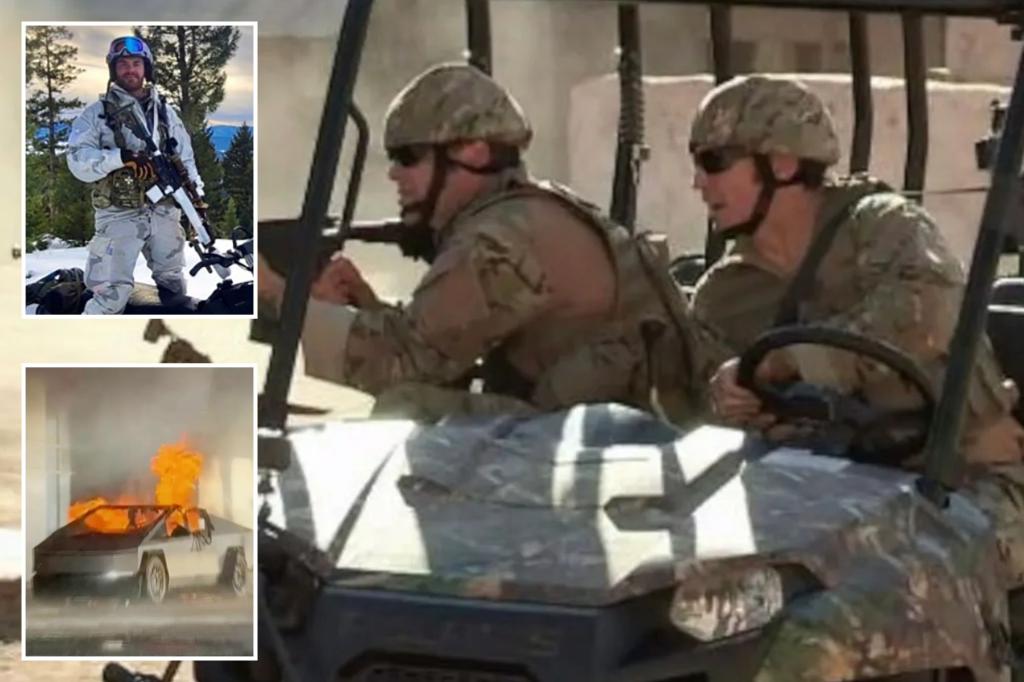Las Vegas Cybertruck bomber Matthew Livelsberger competed in a military reality TV competition over a decade before he killed himself and blew up the Tesla vehicle outside Trump International Hotel on New Year’s Day.
Livelsberger was featured on the third episode of History Channel’s “Ultimate Soldier Challenge,” which aired on March 4, 2013, and forced participants to complete a mock operation of SEAL Team Six’s raid on Osama Bin Laden.
The Army Special Forces member, who went by his nickname “Matt Berg,” teamed up with fellow Green Beret and MMA fighter Tim Kennedy against two commandos seemingly from Norway’s Forsvarets Spesialkommando (FSK) unit and a pair of “rogue” military contractors.
Livelsberger and Kennedy hadn’t met before the episode was filmed, but placed first in each challenge and won the “Ultimate Soldier Challenge.”
Kennedy recalled working alongside Livelsberger in a post to Instagram late Friday night.
“Thirteen years ago I competed in a shooting competition on History Channel called The Ultimate Soldiers Challenge. My partner in this competition was Matt Burg (aka Matt Livelsberger),” he wrote.
“Last night when I saw old photos of him on the news, I put together that it was the same guy.”
The retired MMA and UFC fighter described Livelsberger as “sincere, hard-working and talented.”
“I am flabbergasted and heartbroken to hear the news. None of this makes sense and I like many others are confused and want answers,” he concluded.
In the final challenge to crown the show’s winner, Livelsberger and Kennedy completed an assault-style mission based on the 2011 Osama bin Laden raid where they had to eliminate live targets and recover several pieces of intel.
Livelsberger bragged about his ability to use any weapon during the 43-minute episode.
“I’ve yet to run into something that I can’t pickup,” he said. “My first pistol was an M-9, which is currently used, my first rifle was an M-4, it’s a personal thing I like to do in my spare time.”
In a separate segment, Livelsberger acknowledged the techniques he had learned and adapted throughout his military career.
“The most important thing I’ve learned in combat is to always have each other’s back, that’s how missions get done successfully,” Livelsberger said.
As the show wrapped up, Livelsberger claimed he suffered from heat exhaustion and needed on-set medical attention when he felt dizzy and began to hyperventilate.
In his victory speech, Livelsberger paid homage “to the guys that came before us and the guys currently serving in Afghanistan.”
The post-show remarks mirrored the ones he wrote in a note investigators found in his phone after the fiery Las Vegas explosion.
“Why did I personally do it now? I needed to cleanse my mind of the brothers I’ve lost and relieve myself of the burden of the lives I took,” he wrote in a suicide note, according to officials.
Follow the latest on the Cybertruck explosion outside a Trump Hotel in Las Vegas:
Livelsberger, 37, left his Colorado Springs home on Dec. 26, following a fight with his wife, who had discovered he had been cheating on her, before he rented the Cybertruck off the Turo app.
The father of one then loaded the Tesla with explosives and fireworks before parking the truck in the valet area of the Las Vegas Trump Hotel before shooting himself.
Livelsberger said the spectacle at Trump International wasn’t a terrorist attack, but a wake-up call and a way to grab the attention of Americans.
“We are being led by weak and feckless leadership who only serve to enrich themselves,” Livelsberger said in a second note, according to authorities.
“We are the United States of America, the best country people to ever exist! But right now we are terminally ill and headed toward collapse.”
Livelsberger, who had been deployed to Afghanistan in 2017 and 2018, was known to be a “Rambo-type patriot” and staunch supporter of President-elect Donald Trump.
He had been in the Army for at least 19 years, joining the Green Berets in 2006, according to his LinkedIn profile.
Livelsberger served in active duty from Jan. 2006 to March 2011 when he joined the National Guard until July 2012, ABC News reported, citing a spokesperson for the Bureau of Alcohol, Tobacco, Firearms and Explosives.
He joined the Army Reserve from July 2012 to Dec. of the same year, at which time he competed on the military challenge.
The dedicated soldier returned to active duty in Dec. 2012 as a Special Operations soldier.
Read the full article here


